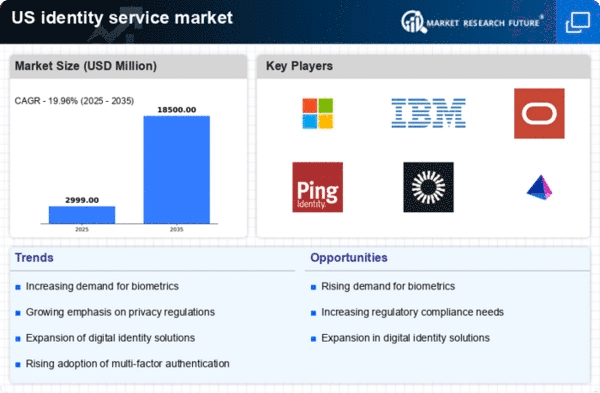Increasing Cybersecurity Threats
The identity service market is experiencing heightened demand. This demand is due to the increasing frequency and sophistication of cybersecurity threats. Organizations are compelled to adopt robust identity management solutions to safeguard sensitive data and maintain customer trust. In 2025, it is estimated that cybercrime will cost businesses globally over $10 trillion annually, underscoring the urgency for effective identity services. As data breaches become more prevalent, the identity service market is likely to expand, with companies investing in advanced authentication methods and identity verification technologies. This trend indicates a growing recognition of the importance of identity services in mitigating risks associated with cyber threats, thereby driving market growth.
Shift Towards Digital Transformation
The ongoing digital transformation across various sectors is significantly influencing the identity service market. Businesses are increasingly moving towards digital platforms, necessitating secure and efficient identity management solutions. In 2025, the digital transformation market is projected to reach $3 trillion, with identity services playing a crucial role in this transition. Organizations are adopting cloud-based identity solutions to enhance user experience and streamline operations. This shift not only improves operational efficiency but also fosters innovation, as companies leverage identity services to create seamless digital interactions. Consequently, the identity service market is poised for substantial growth as organizations prioritize digital identity management.
Growing Demand for Remote Work Solutions
The rise of remote work has created a pressing need for secure identity management solutions, propelling the identity service market forward. As organizations adapt to flexible work arrangements, they require reliable identity verification processes to ensure secure access to corporate resources. In 2025, it is anticipated that remote work will account for over 30% of the workforce in the US, highlighting the necessity for effective identity services. This trend suggests that companies are increasingly investing in identity solutions that facilitate secure remote access, thereby driving the growth of the identity service market. The focus on remote work security is likely to remain a key driver in the coming years.
Emergence of Decentralized Identity Solutions
The identity service market is witnessing a shift towards decentralized identity solutions. These solutions offer enhanced security and user control. This emerging trend is driven by the need for individuals to manage their own identities without relying on centralized authorities. In 2025, the decentralized identity market is projected to grow significantly, as more organizations recognize the benefits of this approach. By leveraging blockchain technology, decentralized identity solutions provide a secure and transparent method for identity verification. This innovation not only empowers users but also reduces the risk of identity theft and fraud. As the demand for privacy-centric solutions increases, the identity service market is likely to evolve, incorporating decentralized models.
Regulatory Landscape and Compliance Requirements
The evolving regulatory landscape in the US is significantly impacting the identity service market. Organizations are facing stringent compliance requirements related to data protection and privacy, compelling them to adopt comprehensive identity management solutions. In 2025, it is expected that compliance-related spending will exceed $20 billion, reflecting the importance of adhering to regulations such as GDPR and CCPA. This regulatory pressure is driving businesses to invest in identity services that ensure compliance and mitigate legal risks. As organizations navigate complex regulatory frameworks, the identity service market is likely to see increased demand for solutions that facilitate compliance and enhance data security.
















